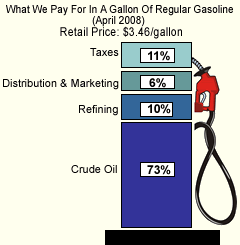 New Gas Mileage Rates and Estimates
New Gas Mileage Rates and Estimates
By: Jake | June 30, 2008 | Category: Money
Those of you who use your car for business purposes can rejoice a little bit. The Internal Revenue Service increased the optional standard mileage rates for the rest of the year because of rising gas prices.
For every business mile driven from July 1 to December 31, 2008 taxpayers can use the rate of 58.5 cents to calculate deductible costs, 8 cents more than the 50.5 than the first half of 2008. The IRS also increased the standard deductible rates for medical/moving purposes from 19 to 27 cents. The agency doesn't normally change rates midyear but decided it was necessary due to rising gas prices.
This change means that federal government employees who use their own cars for government work may see an increase in their reimbursement rates since the U.S. General Services Administration announced they're reviewing privately owned vehicle reimbursement rates. UPDATE: On August 1, 2008 the new rate for federal employees will be 58.5 cents per mile.
It seems whenever I post about something related to gas prices I get a few comments about specific types of cars. So I thought I'd mention that 55 years ago today the first Chevrolet Corvette rolled off the assembly line in Flint, Michigan.
The Environmental Protection Agency recently adjusted automobile gasoline mile per gallon estimates to take into account idling and other driver habits to make them more realistic. Fueleconomy.gov applied these new estimates to every automobile manufactured since 1985.
I am curious how many miles per gallon of gasoline the 1955 Corvette got. By the new estimates a 1985 Corvette gets about 15 miles a gallon in the city and 20 on the highway. I bet the 1955 Corvette gets far less. Does anyone know?
![]()
Permalink
| View Comments [6]
| ![]() E-mail This Entry
| Tags:
business_mileage
fuel
gas_mileage
jake
tax
E-mail This Entry
| Tags:
business_mileage
fuel
gas_mileage
jake
tax


